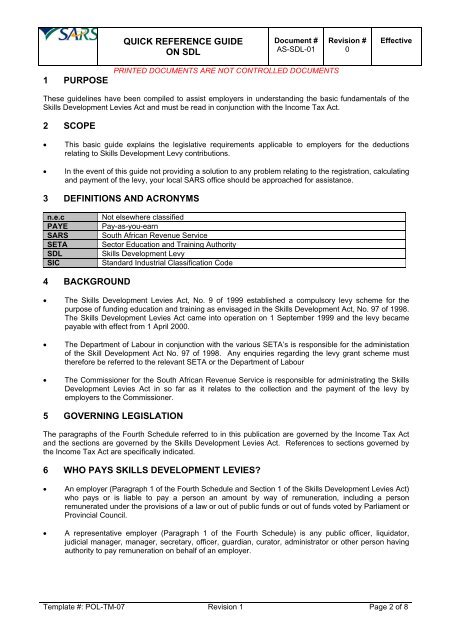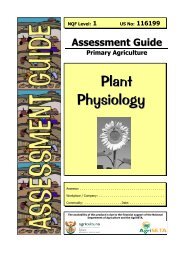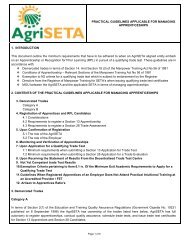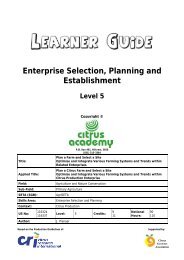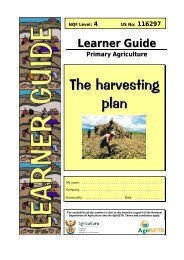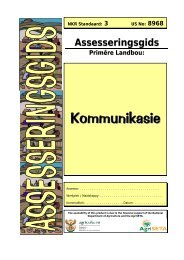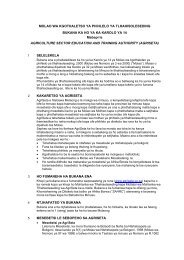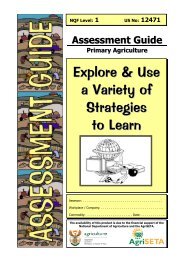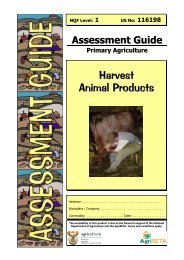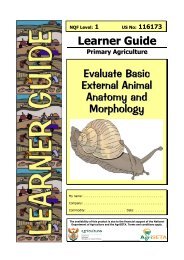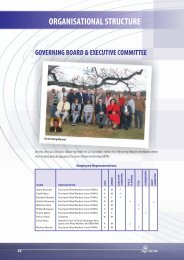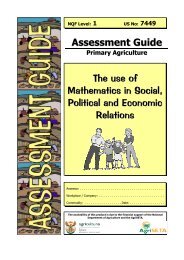QUICK REFERENCE GUIDE ON SDL REVISION ... - AgriSETA
QUICK REFERENCE GUIDE ON SDL REVISION ... - AgriSETA
QUICK REFERENCE GUIDE ON SDL REVISION ... - AgriSETA
You also want an ePaper? Increase the reach of your titles
YUMPU automatically turns print PDFs into web optimized ePapers that Google loves.
<strong>QUICK</strong> <strong>REFERENCE</strong> <strong>GUIDE</strong><br />
<strong>ON</strong> <strong>SDL</strong><br />
Document #<br />
AS-<strong>SDL</strong>-01<br />
Revision #<br />
0<br />
Effective<br />
1 PURPOSE<br />
PRINTED DOCUMENTS ARE NOT C<strong>ON</strong>TROLLED DOCUMENTS<br />
These guidelines have been compiled to assist employers in understanding the basic fundamentals of the<br />
Skills Development Levies Act and must be read in conjunction with the Income Tax Act.<br />
2 SCOPE<br />
• This basic guide explains the legislative requirements applicable to employers for the deductions<br />
relating to Skills Development Levy contributions.<br />
• In the event of this guide not providing a solution to any problem relating to the registration, calculating<br />
and payment of the levy, your local SARS office should be approached for assistance.<br />
3 DEFINITI<strong>ON</strong>S AND ACR<strong>ON</strong>YMS<br />
n.e.c<br />
PAYE<br />
SARS<br />
SETA<br />
<strong>SDL</strong><br />
SIC<br />
Not elsewhere classified<br />
Pay-as-you-earn<br />
South African Revenue Service<br />
Sector Education and Training Authority<br />
Skills Development Levy<br />
Standard Industrial Classification Code<br />
4 BACKGROUND<br />
• The Skills Development Levies Act, No. 9 of 1999 established a compulsory levy scheme for the<br />
purpose of funding education and training as envisaged in the Skills Development Act, No. 97 of 1998.<br />
The Skills Development Levies Act came into operation on 1 September 1999 and the levy became<br />
payable with effect from 1 April 2000.<br />
• The Department of Labour in conjunction with the various SETA’s is responsible for the administation<br />
of the Skill Development Act No. 97 of 1998. Any enquiries regarding the levy grant scheme must<br />
therefore be referred to the relevant SETA or the Department of Labour<br />
• The Commissioner for the South African Revenue Service is responsible for administrating the Skills<br />
Development Levies Act in so far as it relates to the collection and the payment of the levy by<br />
employers to the Commissioner.<br />
5 GOVERNING LEGISLATI<strong>ON</strong><br />
The paragraphs of the Fourth Schedule referred to in this publication are governed by the Income Tax Act<br />
and the sections are governed by the Skills Development Levies Act. References to sections governed by<br />
the Income Tax Act are specifically indicated.<br />
6 WHO PAYS SKILLS DEVELOPMENT LEVIES<br />
• An employer (Paragraph 1 of the Fourth Schedule and Section 1 of the Skills Development Levies Act)<br />
who pays or is liable to pay a person an amount by way of remuneration, including a person<br />
remunerated under the provisions of a law or out of public funds or out of funds voted by Parliament or<br />
Provincial Council.<br />
• A representative employer (Paragraph 1 of the Fourth Schedule) is any public officer, liquidator,<br />
judicial manager, manager, secretary, officer, guardian, curator, administrator or other person having<br />
authority to pay remuneration on behalf of an employer.<br />
Template #: POL-TM-07 Revision 1 Page 2 of 8


